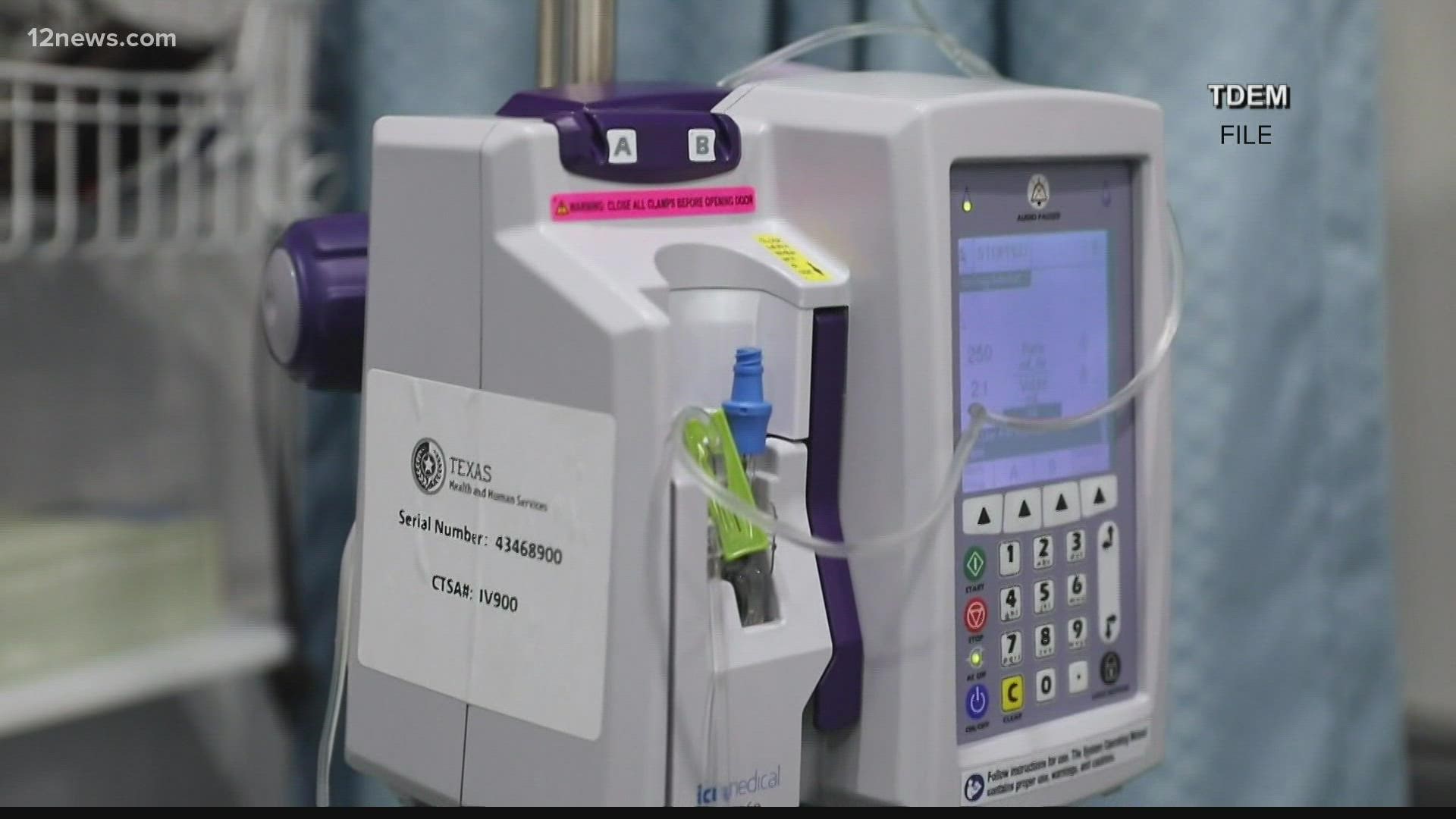PHOENIX — One treatment that's effective at helping those who are at high risk of becoming seriously ill from COVID-19 is monoclonal antibodies.
However, with the omicron variant spreading throughout the world - and in Arizona - hospitals are pausing the use of monoclonal antibody treatments because some aren’t as effective against the fast-spreading variant as others.
Right now, Arizona hospitals are waiting for shipments of the one that is effective against omicron to arrive.
Waiting for supply
Banner Health and Valleywise Health both said this week they are pausing the use of monoclonal antibody treatments in their hospitals because what they’ve been using isn’t effective against the omicron variant.
“We at Valleywise Health are awaiting our allocation from this we have currently paused the use of monoclonal antibodies in our emergency department until we get this treatment,” Dr. Michael White explained this week. White is the Chief Clinical Officer for Valleywise Health.
Dr. Marjorie Bessel, the chief clinical officer at Banner Health, said Tuesday the hospital system that has cared for a majority of COVID-19 patients in Arizona throughout the pandemic is also pausing the use of the monoclonal antibodies they have.
“A different monoclonal antibody, Sotrovimab, is efficacious, but there is no supply of Sotrovimab in Banner Health facilities at this time,” Bessel said.
Bessel said Banner Health is supposed to receive a shipment next week but said supply would be limited of Sotrovimab.
The Arizona Department of Health Services did not respond to 12 News’ questions regarding how much supply of Sotrovimab would be arriving in Arizona and when.
Maricopa County Department of Public Health spokesperson, Sonia Singh told 12 News the county is still planning to stand up additional infusion sites for monoclonal antibody treatment in January.
Omicron rising in Arizona
Earlier in December, the U.S. Department of Health and Human Services paused the shipments of the two monoclonal antibody treatments that have been found not to be effective against omicron.
However, the notice said in regions where omicron is not as prevalent, whatever supply currently exists for monoclonal antibodies could be used.
The Arizona Department of Health Services is still encouraging the use of monoclonal antibody treatments that aren’t as effective against omicron as they are still effective against the delta variant.
“I think it really is a matter of just a few weeks before we really are in an omicron pandemic here in Arizona,” Dr. David Engelthaler, Director of TGen’s infectious disease wing said.
Engelthaler has been monitoring the spread of variants in Arizona since the pandemic started through genomic sequencing.
Currently, Engelthaler estimates COVID-19 cases are 50% omicron variant, and still 50% the delta variant.
“If we have even 50% of our cases are still delta, that’s a lot of delta, that’s a lot that has a higher risk of becoming serious infections versus omicron which may not have that risk with it,” Engelthaler said.
Engelthaler anticipates omicron will be the dominant variant in Arizona, and across the United States, in a matter of a few weeks.
“Right now we’re in that transition zone between a delta pandemic and an omicron pandemic,” Engelthaler said. “As we get more and more and more to omicron those other therapies won’t work as well.”
With omicron spreading in Arizona, Engelthaler says that omicron doesn’t appear to cause as severe of illness as past COVID variants have.
“We don’t want to catastrophize this, but we don’t want to become complacent in thinking that we just have a common cold,” Engelthaler said. “Because those at risk are still at risk, especially the high-risk ones, so we want to protect them.”
Engelthaler notes much has changed in the pandemic, but more tools are now available than previous waves of the virus.
“We also want to understand as this kind of omicron tsunami really washes over us that we actually have really good tools to help save those most at risk as well,” Engelthaler said. “We have better therapies, we have the new drugs coming out, we’re gonna get through this.”
Trying to help patients
Dr. Natasha Bhyuan, a family physician and professor with the University of Arizona College of Medicine-Phoenix said COVID-19 patients are getting diagnosed every day, but are struggling to find places for them to get an infusion of monoclonal antibodies.
“It has been frustrating and difficult for us in primary care because our treatment options for COVID are now severely limited knowing that there are many monoclonal antibodies that are effective against the omicron variant,” Bhyuan said.
Bhyuan said it’s become a supply chain issue with HHS stopping shipments of the monoclonal antibody treatments not as effective against omicron. Plus, Bhyuan said it’s impossible for doctors to know for every patient which variant they have because not everyone is sequenced.
“Of course ideally, we’d want them to get the most effective treatment, but really at this point there are not many treatments available for patients,” Bhyuan said.
Bhyuan said while there’s hope with Pfizer’s new COVID pill, Paxlovid, set to come to Arizona, both Paxlovid and Sotrovimab are expected to be in short supply.
“There are people, again, who qualify for monoclonal antibodies right now and they’re not able to access treatment and it is really hard to be in primary care because it feels like we’re up against a supply chain issue,” Bhyuan said.
COVID-19 News and Updates
Subscribe to the 12 News YouTube channel to receive notifications on the latest videos about the latest information on the coronavirus.

